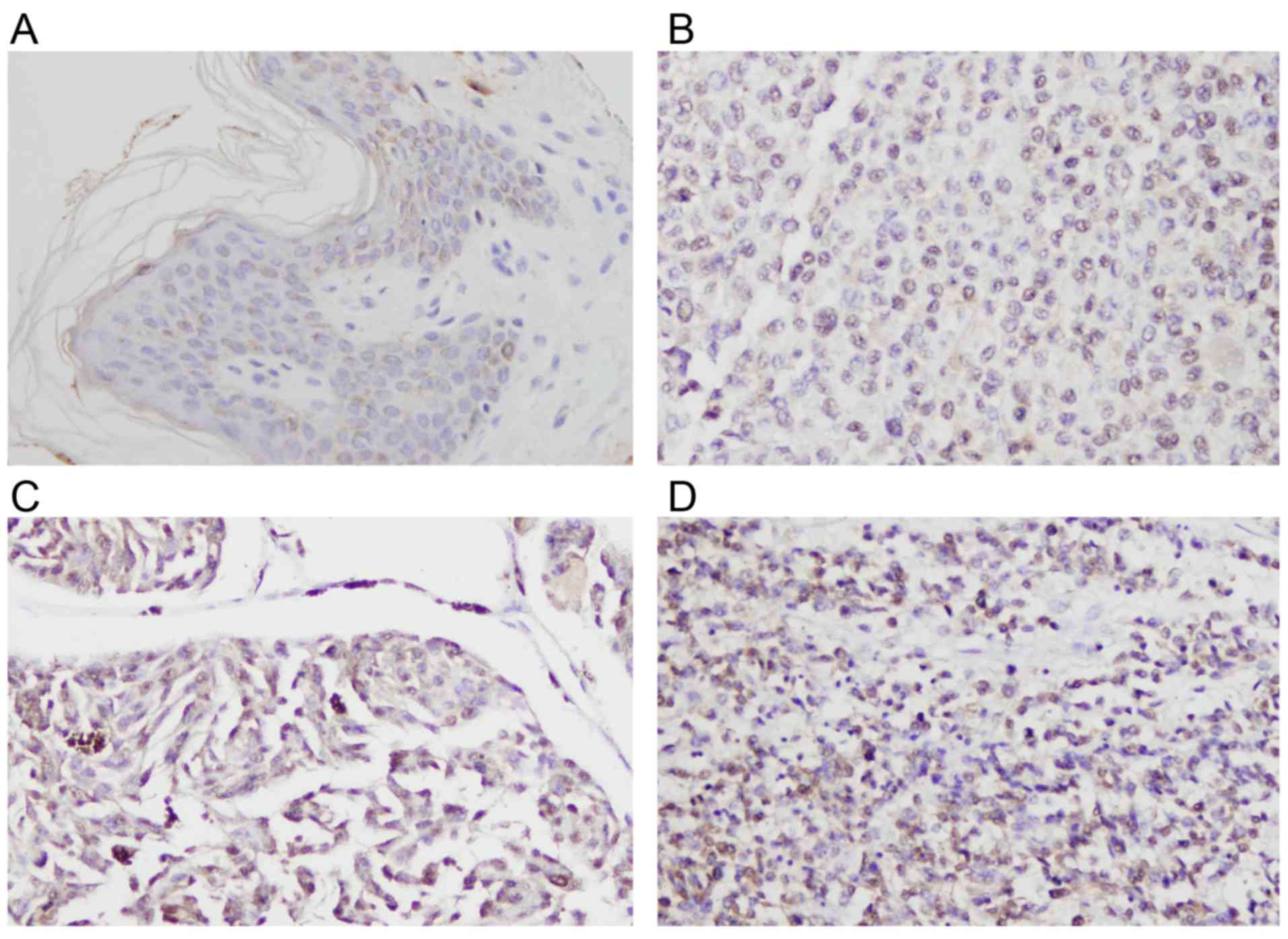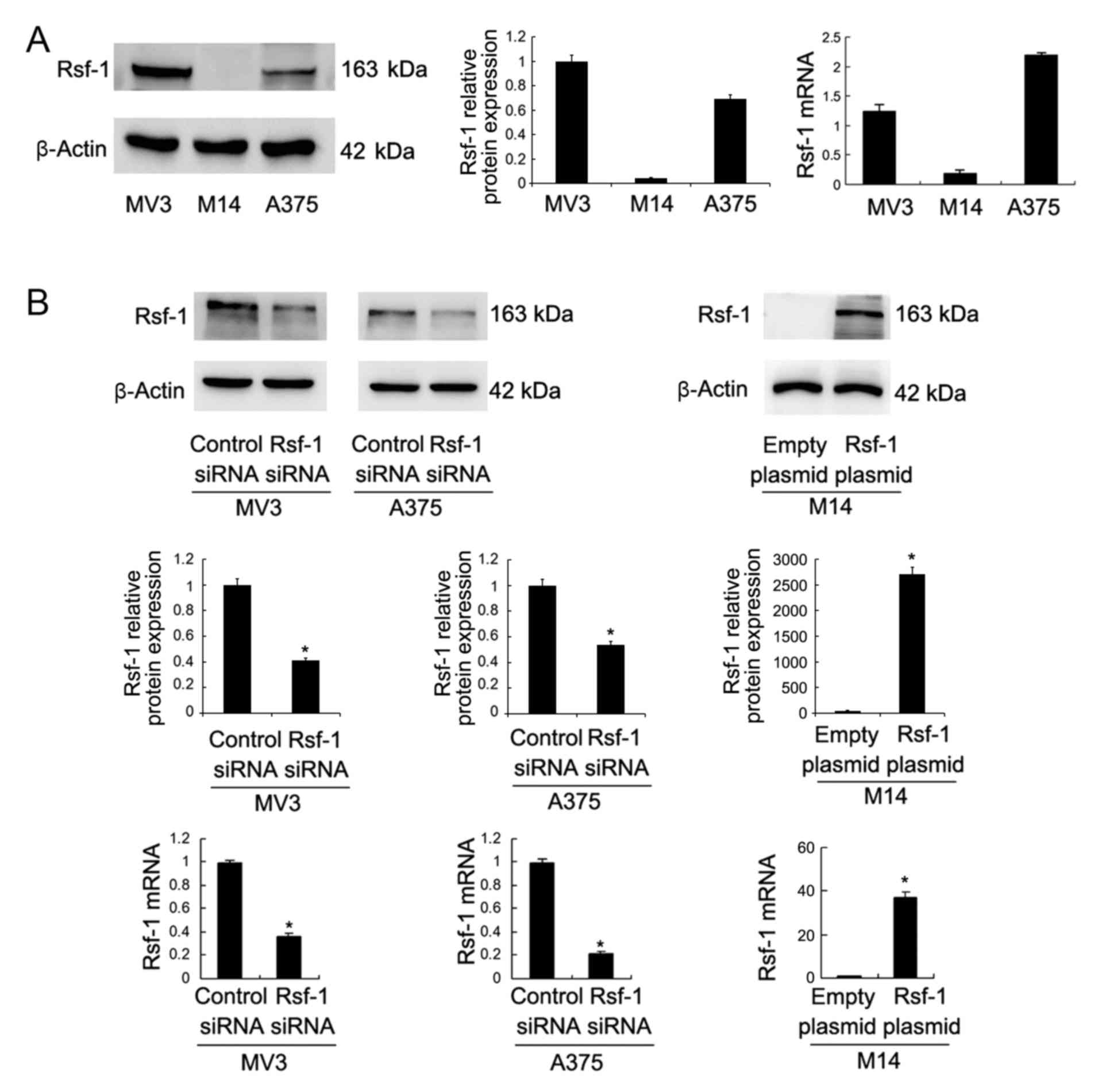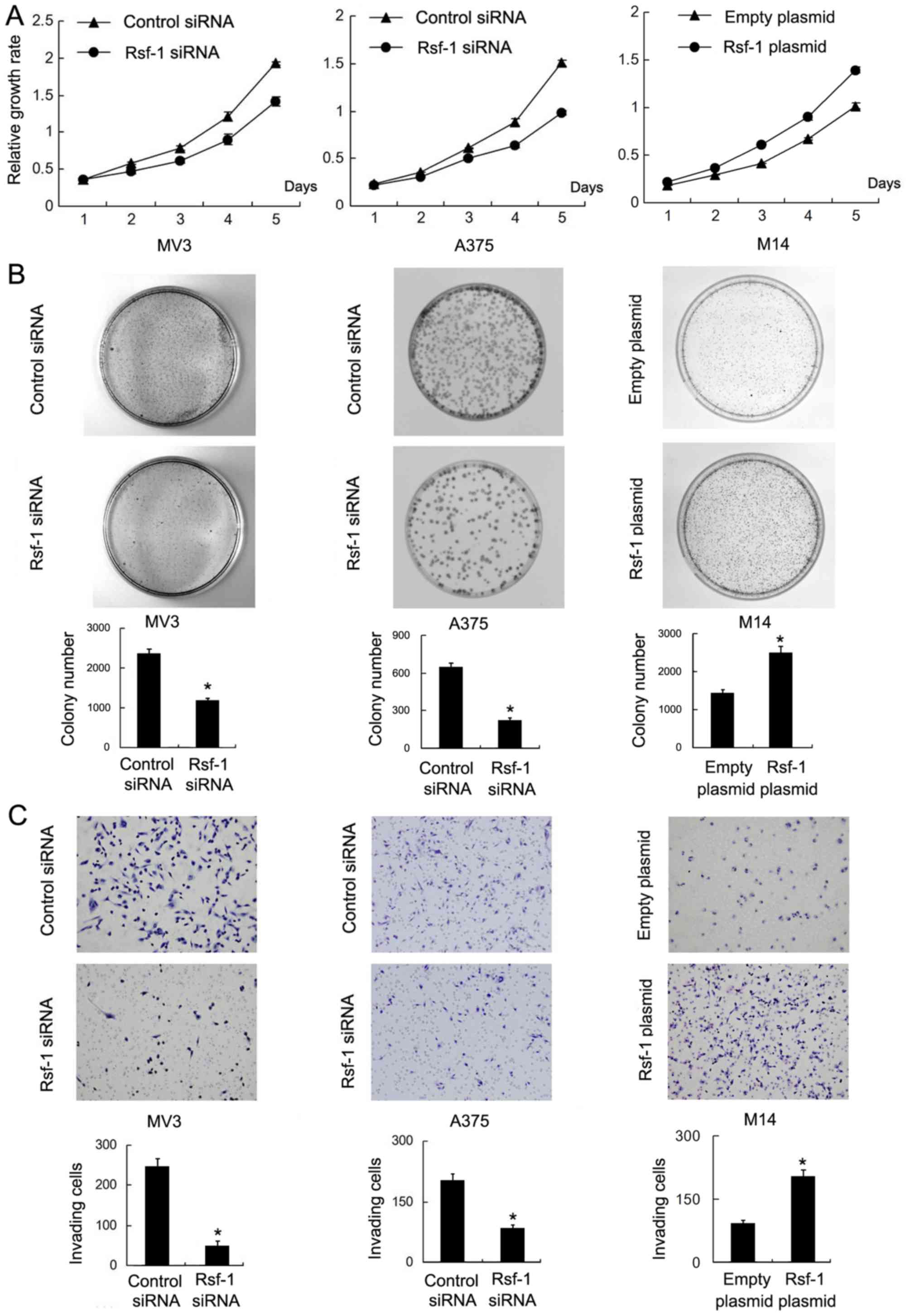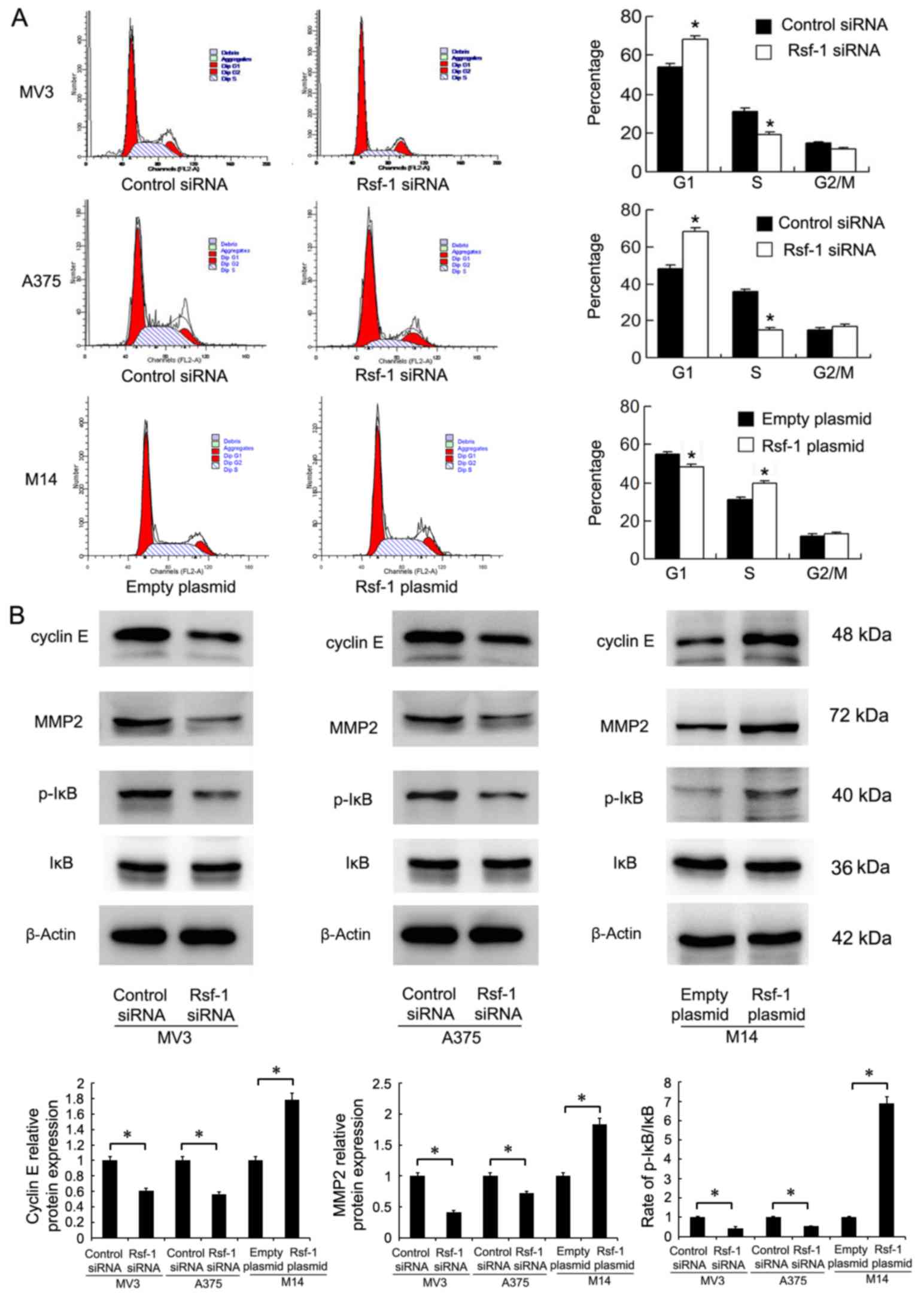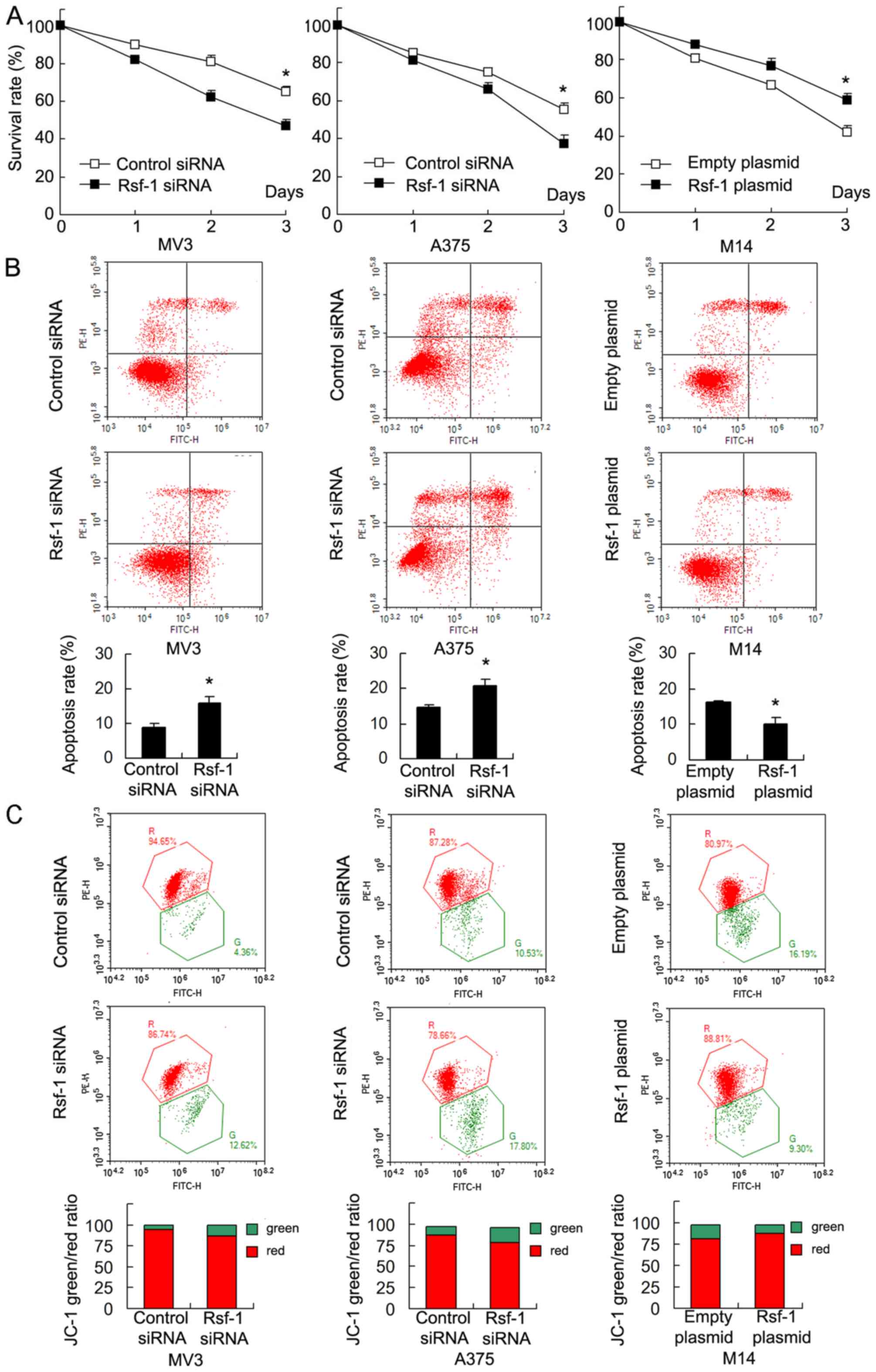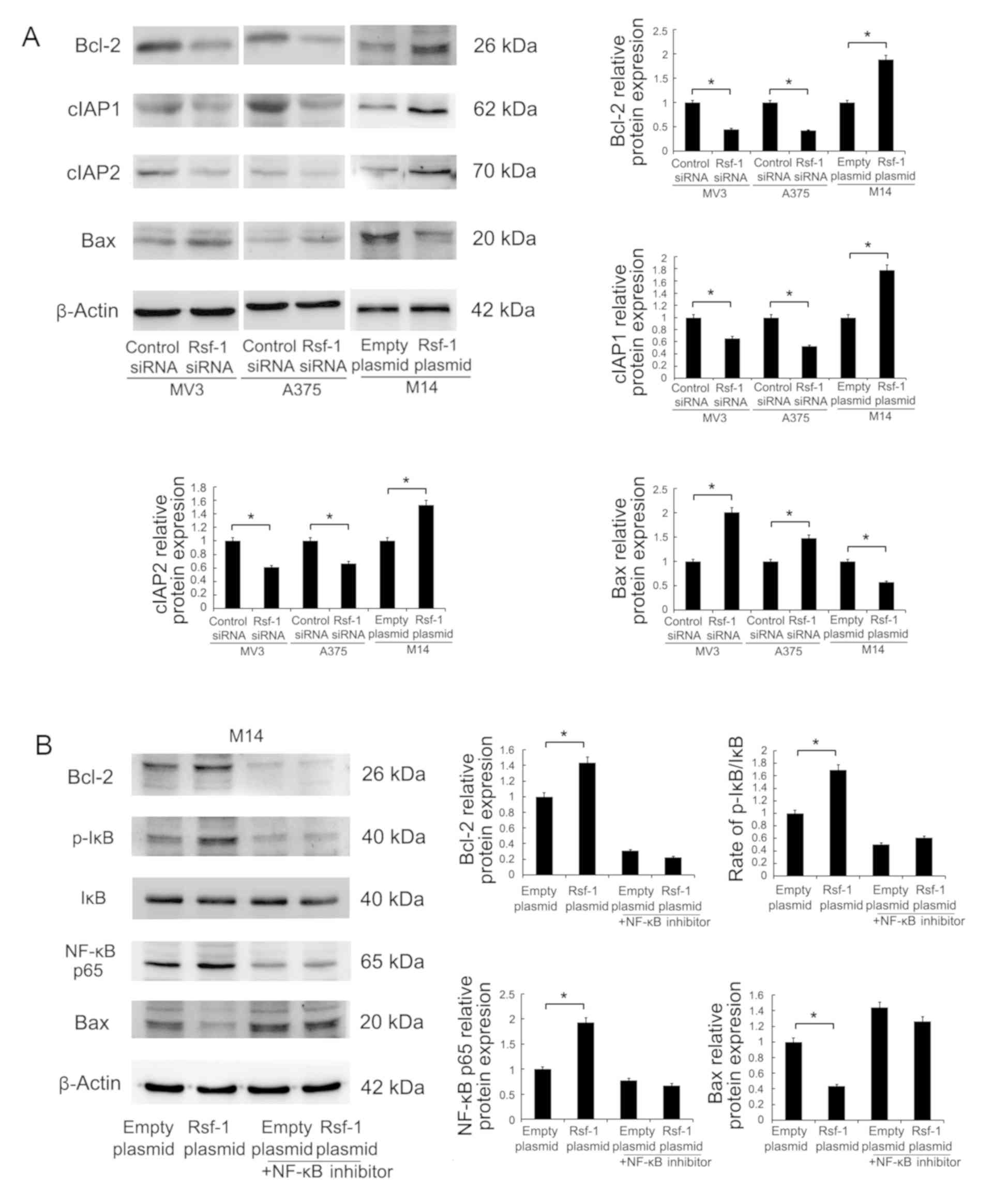|
1
|
Merrill SJ, Subramanian M and Godar DE:
Worldwide cutaneous malignant melanoma incidences analyzed by sex,
age, and skin type over time (1955–2007): Is HPV infection of
androgenic hair follicular melanocytes a risk factor for developing
melanoma exclusively in people of European-ancestry?
Dermatoendocrinol. 8:e12153912016. View Article : Google Scholar : PubMed/NCBI
|
|
2
|
Li H, Pedersen L, Nørgaard M, Ulrichsen
SP, Thygesen SK and Nelson JJ: The occurrence of non-melanoma
malignant skin lesions and non-cutaneous squamous-cell carcinoma
among metastatic melanoma patients: An observational cohort study
in Denmark. BMC Cancer. 16:2952016. View Article : Google Scholar : PubMed/NCBI
|
|
3
|
Nahar VK, Allison Ford M, Brodell RT,
Boyas JF, Jacks SK, Biviji-Sharma R, Haskins MA and Bass MA: Skin
cancer prevention practices among malignant melanoma survivors: A
systematic review. J Cancer Res Clin Oncol. 142:1273–1283. 2016.
View Article : Google Scholar : PubMed/NCBI
|
|
4
|
Peterson M, Albertini MR and Remington P:
Remington, incidence, survival, and mortality of malignant
cutaneous melanoma in wisconsin, 1995–2011. WMJ. 114:196–201.
2015.PubMed/NCBI
|
|
5
|
Johnson-Obaseki SE, Labajian V, Corsten MJ
and McDonald JT: Incidence of cutaneous malignant melanoma by
socioeconomic status in Canada: 1992–2006. J Otolaryngol Head Neck
Surg. 44:532015. View Article : Google Scholar : PubMed/NCBI
|
|
6
|
Dzambova M, Sečníková Z, Jiráková A,
Jůzlová K, Viklický O, Hošková L, Göpfertovà D and Hercogová J:
Malignant melanoma in organ transplant recipients: Incidence,
outcomes, and management strategies: A review of literature.
Dermatol Ther. 29:64–68. 2016. View Article : Google Scholar : PubMed/NCBI
|
|
7
|
Brewer JD, Shanafelt TD, Call TG, Cerhan
JR, Roenigk RK, Weaver AL and Otley CC: Increased incidence of
malignant melanoma and other rare cutaneous cancers in the setting
of chronic lymphocytic leukemia. Int J Dermatol. 54:e287–e293.
2015. View Article : Google Scholar : PubMed/NCBI
|
|
8
|
Chang HY, Feng HL, Wang L, Chou P and Wang
PF: The Incidence, prevalence, and survival of malignant melanoma
in Taiwan. Value Health. 17:A7402014. View Article : Google Scholar : PubMed/NCBI
|
|
9
|
Nowak-Sadzikowska J, Walasek T, Jakubowicz
J, Blecharz P and Reinfuss M: Current treatment options of brain
metastases and outcomes in patients with malignant melanoma. Rep
Pract Oncol Radiother. 21:271–277. 2016. View Article : Google Scholar : PubMed/NCBI
|
|
10
|
Schmid-Wendtner M and Wendtner CM:
Treatment of metastatic malignant melanoma. Dtsch Med Wochenschr.
141:10002016.(In German). PubMed/NCBI
|
|
11
|
Kozovska Z, Gabrisova V and Kucerova L:
Malignant melanoma: Diagnosis, treatment and cancer stem cells.
Neoplasma. 63:510–517. 2016. View Article : Google Scholar : PubMed/NCBI
|
|
12
|
Harries M, Malvehy J, Lebbe C, Heron L,
Amelio J, Szabo Z and Schadendorf D: Treatment patterns of advanced
malignant melanoma (stage III–IV)-A review of current standards in
Europe. Eur J Cancer. 60:179–189. 2016. View Article : Google Scholar : PubMed/NCBI
|
|
13
|
Sheu JJ, Choi JH, Guan B, Tsai FJ, Hua CH,
Lai MT, Wang TL and Shih IeM: Rsf-1, a chromatin remodelling
protein, interacts with cyclin E1 and promotes tumour development.
J Pathol. 229:559–568. 2013. View Article : Google Scholar : PubMed/NCBI
|
|
14
|
Hanai K, Furuhashi H, Yamamoto T, Akasaka
K and Hirose S: RSF governs silent chromatin formation via histone
H2Av replacement. PLoS Genet. 4:e10000112008. View Article : Google Scholar : PubMed/NCBI
|
|
15
|
Liang PI, Wu LC, Sheu JJ, Wu TF, Shen KH,
Wang YH, Wu WR, Shiue YL, Huang HY, Hsu HP, et al: Rsf-1/HBXAP
overexpression is independent of gene amplification and is
associated with poor outcome in patients with urinary bladder
urothelial carcinoma. J Clin Pathol. 65:802–807. 2012. View Article : Google Scholar : PubMed/NCBI
|
|
16
|
Min S, Jo S, Lee HS, Chae S, Lee JS, Ji JH
and Cho H: ATM-dependent chromatin remodeler Rsf-1 facilitates DNA
damage checkpoints and homologous recombination repair. Cell Cycle.
13:666–677. 2014. View
Article : Google Scholar : PubMed/NCBI
|
|
17
|
Goldfarb DM, Gukova LA, Chernin LS,
Avdienko ID, Mnatsakanian GG, Kushner IC, Kuznetsova VN and
Strachova TS: Rsf mutants of Escherichia coli HfrC defective in the
production of the factor stimulating recombination in conjugation.
Mol Gen Genet. 129:295–310. 1974. View Article : Google Scholar : PubMed/NCBI
|
|
18
|
Iwasa H, Kuroyanagi H, Maimaiti S, Ikeda
M, Nakagawa K and Hata Y: Characterization of RSF-1, the
Caenorhabditis elegans homolog of the Ras-association domain family
protein 1. Exp Cell Res. 319:1–11. 2013. View Article : Google Scholar : PubMed/NCBI
|
|
19
|
Fang FM, Li CF, Huang HY, Lai MT, Chen CM,
Chiu IW, Wang TL, Tsai FJ, Shih IeM and Sheu JJ: Overexpression of
a chromatin remodeling factor, RSF-1/HBXAP, correlates with
aggressive oral squamous cell carcinoma. Am J Pathol.
178:2407–2415. 2011. View Article : Google Scholar : PubMed/NCBI
|
|
20
|
Li H, Zhang Y, Zhang Y, Bai X, Peng Y and
He P: Rsf-1 overexpression in human prostate cancer, implication as
a prognostic marker. Tumour Biol. 35:5771–5776. 2014. View Article : Google Scholar : PubMed/NCBI
|
|
21
|
Li Q, Dong Q and Wang E: Rsf-1 is
overexpressed in non-small cell lung cancers and regulates cyclinD1
expression and ERK activity. Biochem Biophys Res Commun. 420:6–10.
2012. View Article : Google Scholar : PubMed/NCBI
|
|
22
|
Lin CY, Tian YF, Wu LC, Chen LT, Lin LC,
Hsing CH, Lee SW, Sheu MJ, Lee HH, Wang YH, et al: Rsf-1 expression
in rectal cancer: With special emphasis on the independent
prognostic value after neoadjuvant chemoradiation. J Clin Pathol.
65:687–692. 2012. View Article : Google Scholar : PubMed/NCBI
|
|
23
|
Liu S, Dong Q and Wang E: Rsf-1
overexpression correlates with poor prognosis and cell
proliferation in colon cancer. Tumour Biol. 33:1485–1491. 2012.
View Article : Google Scholar : PubMed/NCBI
|
|
24
|
Maeda D, Chen X, Guan B, Nakagawa S, Yano
T, Taketani Y, Fukayama M, Wang TL and Shih IeM: Rsf-1 (HBXAP)
expression is associated with advanced stage and lymph node
metastasis in ovarian clear cell carcinoma. Int J Gynecol Pathol.
30:30–35. 2011. View Article : Google Scholar : PubMed/NCBI
|
|
25
|
Xie C, Fu L, Xie L, Liu N and Li Q: Rsf-1
overexpression serves as a prognostic marker in human
hepatocellular carcinoma. Tumour Biol. 35:7595–7601. 2014.
View Article : Google Scholar : PubMed/NCBI
|
|
26
|
Tai HC, Huang HY, Lee SW, Lin CY, Sheu MJ,
Chang SL, Wu LC, Shiue YL, Wu WR, Lin CM and Li CF: Associations of
Rsf-1 overexpression with poor therapeutic response and worse
survival in patients with nasopharyngeal carcinoma. J Clin Pathol.
65:248–253. 2012. View Article : Google Scholar : PubMed/NCBI
|
|
27
|
Sheu JJ, Choi JH, Yildiz I, Tsai FJ, Shaul
Y, Wang TL and Shih IeM: The roles of human sucrose nonfermenting
protein 2 homologue in the tumor-promoting functions of Rsf-1.
Cancer Res. 68:4050–4057. 2008. View Article : Google Scholar : PubMed/NCBI
|
|
28
|
Choi JH, Sheu JJ, Guan B, Jinawath N,
Markowski P, Wang TL and Shih IeM: Functional analysis of 11q13.5
amplicon identifies Rsf-1 (HBXAP) as a gene involved in paclitaxel
resistance in ovarian cancer. Cancer Res. 69:1407–1415. 2009.
View Article : Google Scholar : PubMed/NCBI
|
|
29
|
Trinidad CM, Torres-Cabala CA, Curry JL,
Prieto VG and Aung PP: Update on eighth edition American Joint
Committee on Cancer classification for cutaneous melanoma and
overview of potential pitfalls in histological examination of
staging parameters. J Clin Pathol. 72:265–270. 2019. View Article : Google Scholar : PubMed/NCBI
|
|
30
|
Zhang X, Fu L, Xue D, Zhang X, Hao F, Xie
L, He J, Gai J, Liu Y, Xu H, et al: Overexpression of Rsf-1
correlates with poor survival and promotes invasion in non-small
cell lung cancer. Virchows Arch. 470:553–560. 2017. View Article : Google Scholar : PubMed/NCBI
|
|
31
|
Livak KJ and Schmittgen TD: Analysis of
relative gene expression data using real-time quantitative PCR and
the 2(-Delta Delta C(T)) method. Methods. 25:402–408. 2001.
View Article : Google Scholar : PubMed/NCBI
|
|
32
|
Jang JH and Surh YJ: Bcl-2 attenuation of
oxidative cell death is associated with up-regulation of
gamma-glutamylcysteine ligase via constitutive NF-kappaB
activation. J Biol Chem. 279:38779–38786. 2004. View Article : Google Scholar : PubMed/NCBI
|
|
33
|
Sheu JJ, Guan B, Choi JH, Lin A, Lee CH,
Hsiao YT, Wang TL, Tsai FJ and Shih IeM: Rsf-1, a chromatin
remodeling protein, induces DNA damage and promotes genomic
instability. J Biol Chem. 285:38260–38269. 2010. View Article : Google Scholar : PubMed/NCBI
|
|
34
|
Mao TL, Hsu CY, Yen MJ, Gilks B, Sheu JJ,
Gabrielson E, Vang R, Cope L, Kurman RJ, Wang TL and Shih IeM:
Expression of Rsf-1, a chromatin-remodeling gene, in ovarian and
breast carcinoma. Hum Pathol. 37:1169–1175. 2006. View Article : Google Scholar : PubMed/NCBI
|
|
35
|
Davidson B, Trope' CG, Wang TL and Shih
IeM: Expression of the chromatin remodeling factor Rsf-1 is
upregulated in ovarian carcinoma effusions and predicts poor
survival. Gynecol Oncol. 103:814–819. 2006. View Article : Google Scholar : PubMed/NCBI
|
|
36
|
Zhao XC, An P, Wu XY, Zhang LM, Long B,
Tian Y, Chi XY and Tong DY: Overexpression of hSNF2H in glioma
promotes cell proliferation, invasion, and chemoresistance through
its interaction with Rsf-1. Tumour Biol. 37:7203–7212. 2016.
View Article : Google Scholar : PubMed/NCBI
|
|
37
|
Ren J, Chen QC, Jin F, Wu HZ, He M, Zhao
L, Yu ZJ, Yao WF, Mi XY, Wang EH and Wei MJ: Overexpression of
Rsf-1 correlates with pathological type, p53 status and survival in
primary breast cancer. Int J Clin Exp Pathol. 7:5595–5608.
2014.PubMed/NCBI
|
|
38
|
Chae S, Ji JH, Kwon SH, Lee HS, Lim JM,
Kang D, Lee CW and Cho H: HBxAPalpha/Rsf-1-mediated HBx-hBubR1
interactions regulate the mitotic spindle checkpoint and chromosome
instability. Carcinogenesis. 34:1680–1688. 2013. View Article : Google Scholar : PubMed/NCBI
|
|
39
|
Hu BS, Yu HF, Zhao G and Zha TZ: High
RSF-1 expression correlates with poor prognosis in patients with
gastric adenocarcinoma. Int J Clin Exp Pathol. 5:668–673.
2012.PubMed/NCBI
|
|
40
|
Rotte A, Martinka M and Li G: MMP2
expression is a prognostic marker for primary melanoma patients.
Cell Oncol (Dordr). 35:207–216. 2012. View Article : Google Scholar : PubMed/NCBI
|
|
41
|
Santala S, Talvensaari-Mattila A, Soini Y
and Santala M: Cyclin E expression correlates with Cancer-specific
survival in endometrial endometrioid adenocarcinoma. Anticancer
Res. 35:3393–3397. 2015.PubMed/NCBI
|
|
42
|
Alsina M, Landolfi S, Aura C, Caci K,
Jimenez J, Prudkin L, Castro S, Moreno D, Navalpotro B, Tabernero J
and Scaltriti M: Cyclin E amplification/overexpression is
associated with poor prognosis in gastric cancer. Ann Oncol.
26:438–439. 2015. View Article : Google Scholar : PubMed/NCBI
|
|
43
|
Deng W, Zhou Y, Tiwari AF, Su H, Yang J,
Zhu D, Lau VM, Hau PM, Yip YL, Cheung AL, et al: p21/Cyclin E
pathway modulates anticlastogenic function of Bmi-1 in cancer
cells. Int J Cancer. 136:1361–1370. 2015. View Article : Google Scholar : PubMed/NCBI
|
|
44
|
Li HC, Chen YF, Feng W, Cai H, Mei Y,
Jiang YM, Chen T, Xu K and Feng DX: Loss of the Opa interacting
protein 5 inhibits breast cancer proliferation through
miR-139-5p/NOTCH1 pathway. Gene. 603:1–8. 2017. View Article : Google Scholar : PubMed/NCBI
|
|
45
|
Chen X, Wong JY, Wong P and Radany EH:
Low-dose valproic acid enhances radiosensitivity of prostate cancer
through acetylated p53-dependent modulation of mitochondrial
membrane potential and apoptosis. Mol Cancer Res. 9:448–461. 2011.
View Article : Google Scholar : PubMed/NCBI
|
|
46
|
Matsuyama S, Palmer J, Bates A,
Poventud-Fuentes I, Wong K, Ngo J and Matsuyama M: Bax-induced
apoptosis shortens the life span of DNA repair defect Ku70-knockout
mice by inducing emphysema. Exp Biol Med (Maywood). 241:1265–1271.
2016. View Article : Google Scholar : PubMed/NCBI
|
|
47
|
Gill C, Dowling C, O'Neill AJ and Watson
RW: Effects of cIAP-1, cIAP-2 and XIAP triple knockdown on prostate
cancer cell susceptibility to apoptosis, cell survival and
proliferation. Mol Cancer. 8:392009. View Article : Google Scholar : PubMed/NCBI
|
|
48
|
Vassina EM, Yousefi S, Simon D, Zwicky C,
Conus S and Simon HU: cIAP-2 and survivin contribute to
cytokine-mediated delayed eosinophil apoptosis. Eur J Immunol.
36:1975–1984. 2006. View Article : Google Scholar : PubMed/NCBI
|
|
49
|
Gyrd-Hansen M and Meier P: IAPs: From
caspase inhibitors to modulators of NF-kappaB, inflammation and
cancer. Nat Rev Cancer. 10:561–574. 2010. View Article : Google Scholar : PubMed/NCBI
|
|
50
|
Hussain AR, Ahmed SO, Ahmed M, Khan OS, Al
Abdulmohsen S, Platanias LC, Al-Kuraya KS and Uddin S: Cross-talk
between NFkB and the PI3-kinase/AKT pathway can be targeted in
primary effusion lymphoma (PEL) cell lines for efficient apoptosis.
PLoS One. 7:e399452012. View Article : Google Scholar : PubMed/NCBI
|
|
51
|
Benimetskaya L, Ayyanar K, Kornblum N,
Castanotto D, Rossi J, Wu S, Lai J, Brown BD, Popova N, Miller P,
et al: Bcl-2 protein in 518A2 melanoma cells in vivo and in vitro.
Clin Cancer Res. 12:4940–4948. 2006. View Article : Google Scholar : PubMed/NCBI
|
|
52
|
Leiter U, Schmid RM, Kaskel P, Peter RU
and Krähn G: Antiapoptotic bcl-2 and bcl-xL in advanced malignant
melanoma. Arch Dermatol Res. 292:225–232. 2000. View Article : Google Scholar : PubMed/NCBI
|















